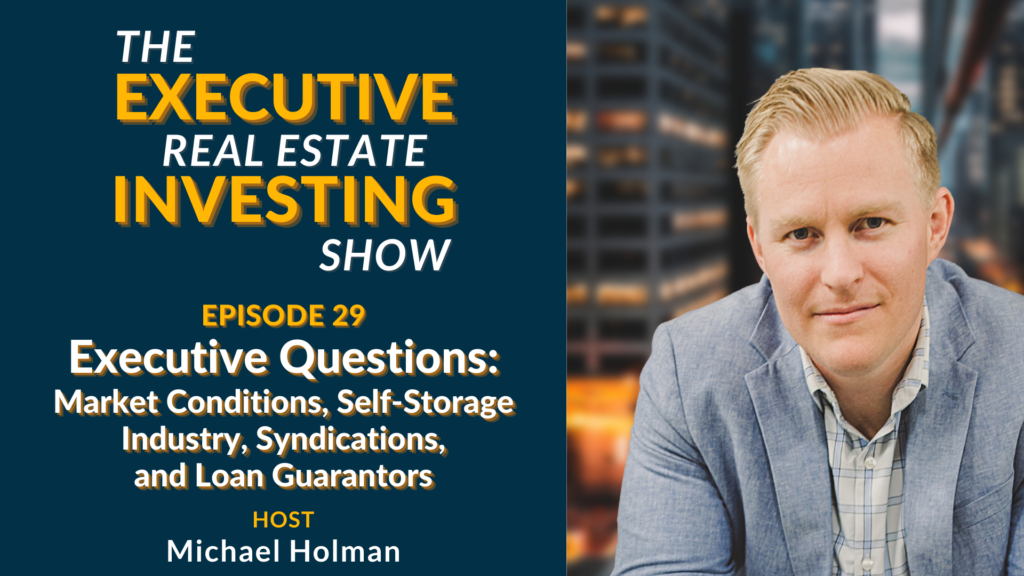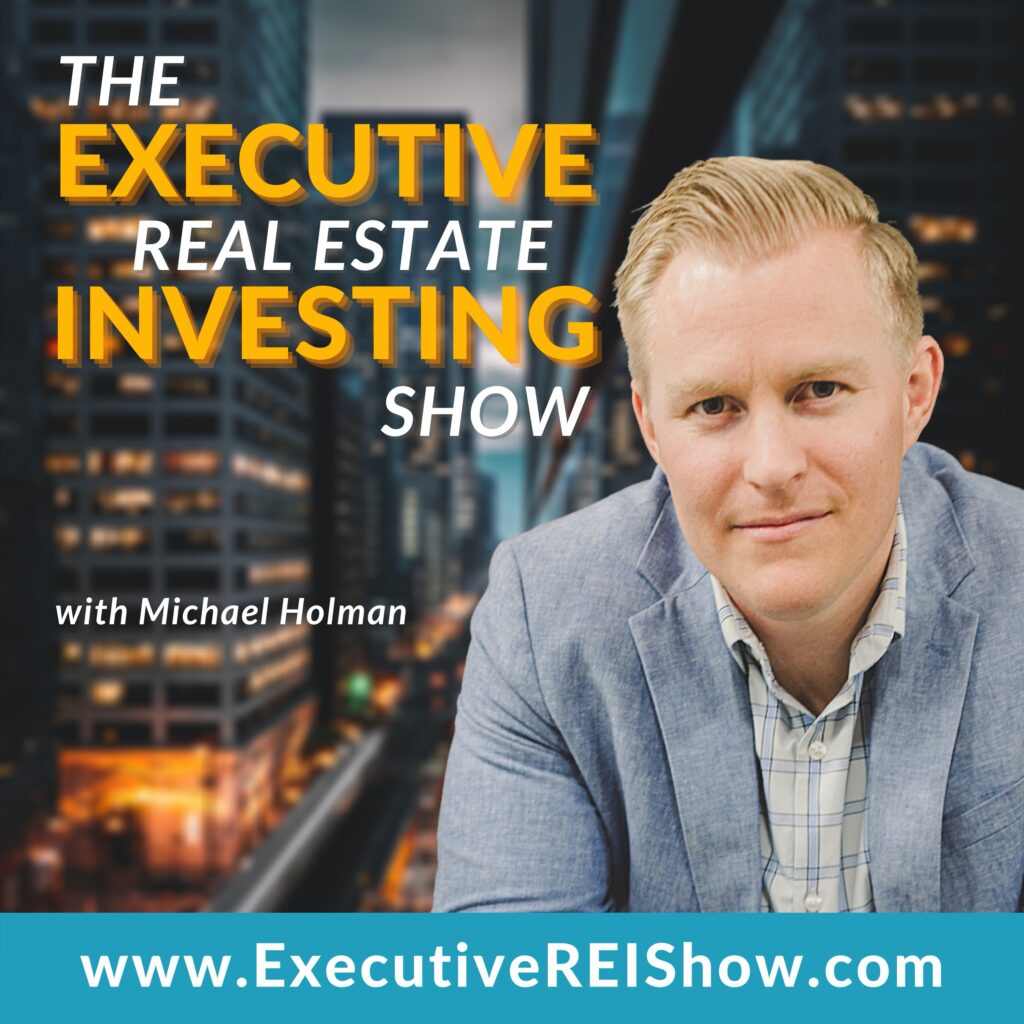
The executive Real estate investing Show
EPISODE 29
Real Estate Investing Q&A: Market Conditions, Self-Storage Industry, Syndications, and Loan Guarantors
- December 20, 2021
EPISODE SUMMARY
As part of our ongoing series Executive Questions, Michael fields questions about making money during fluctuating market conditions, the risk/reward ratio of storage, and being a guarantor on loans. Finally, Michael dives into a question about the basics of 506(b) and 506(c) offerings.
Listen now as Michael answers these questions and expands on each topic to give his advice, based on years of executive experience.
EXECUTIVE TIP
Understand Markets
LISTEN TO THE PODCAST HERE

The Executive Real Estate Investing Show Podcast
EP 29: REI Q&A: Market Conditions, Self-Storage Industry, Syndications, and Loan Guarantors with Michael Holman
Listen on
READ THE TRANSCRIPT HERE
Note: Audio transcription has been automatically transcribed
Welcome to The Executive Real Estate Investing Show. This podcast is for you, the busy business owner or executive looking to create generational wealth. Here, we’re going to show you how to do that through real estate investing from multifamily to industrial and everything in between. You will become a real estate investing expert. And now, here’s your host, Michael Holman.
Michael Holman: Welcome to another episode of the executive real estate investing show. I’m your host, Michael Holman, and great show today because why it is an executive questions segment. I just got handed this wonderful sheet of paper. I have five questions on here and I’m going to answer each and every single one of them for you today right now.
And we are going to go through these starting in just a moment. If you have not left a rating and review for The Executive Real Estate Investing Show, please do so now we need this to get out. We want this to go out to all the other people we love hearing from you. We love hearing from you, we love getting your feedback.
So go ahead and leave us a rating and review whether that’s apple podcasts, whether that’s Spotify, Stitcher, wherever you listen to your podcast. Go ahead and leave us a rating and review. They’re also going to check the website, www.ExecutiveREIShow.com. You can sign up for the newsletter. You can ask one of these executive questions if you’ve been listening and you’ve been hearing these executive questions coming on and on and on.
Well, guess what, if you have your own question that you want. To answer on the show live, then you need to go ahead, go to www.ExecutiveREIShow.com and click executive question type in your question. I’m going to get it and I’m going to answer it for you. And as always, before we get into these questions, got to start with today’s executive tip today’s executive is to understand markets, right?
And the reason I say that is because when you understand the market, when you understand the economy as a whole, you begin to realize that there is ways and opportunities to make money and be successful regardless of the market that we’re in. Right. I was on a podcast, not that long ago, and I, and I was talking, you know, I said, it’s easy to be. It’s easy to make money. When everybody’s making money. I mean, it’s an up market, right? Like, like right now, right.
As of this recording, I am recording this. It’s an up market and everybody’s making money, right? I mean, everybody’s made a few hundred thousand dollars on their home.
Pretty much everybody, stocks are going up. Everybody’s real estate’s going up like everything’s going up. Right? And so it’s easy to make money now, but when you understand the markets, when you understand cycles, that’s when you begin to find that you can pick out and see the details and the patterns that exist.
And that’s, that is the difference between a good investor and a great investor. A good investor can make money when the market. Congratulations. Right. A great investor can be smart enough and intuitive enough to have enough to understand markets that go out, markets that go down and how to make money or preserve capital, which I would say is just as important, if not more important than making money in a downturn.
Right. So understand markets that’s today’s executive tip and we’re not going to waste any time. We’re going to go straight into these questions. Cause I am excited to dig in. I’m excited to read these for what feels like the first time, like I said, this paper gets handed to me as I walk in the door.
I look at it and here I am. Okay, question number one comes from Curtis R and Curtis asks housing prices are high and I’ve heard apartment prices are also high. How can money be made buying apartments in the current market condition? Wait until it falls. Great question, Curtis. And this goes right into what I said with the executive tip.
I cheated because I did read that first question as I was walking in and I changed my executive tip because of it. Right. But the important thing to understand, right? Yes. Housing prices are high, yes, apartment prices are high. Can you still make money? Absolutely. Right. It’s happening every single day.
Now that being said, you have to. What’s important to you and what your risk tolerance is. Right? I mean, I’ve heard, I’ve heard a number of people, right? I, there was one guy I listened to, on a podcast one time and he said something interesting. He said, you know what? I have the most simplistic method of investing in real estate ever.
Right. And he’d been really successful. So take this for what it’s worth. He said, when things feel high, I don’t buy, when things feel low, I buy. Right. I mean, that’s simple. Right and if that’s your model and that’s what you want to follow. Right. But I am telling you there is money to be had and to be made in today’s market as well as the market three years ago, as well as the market 10 years ago.
But it relies mostly on you being strategic, right? When you understand the market, when you understand where it’s going, and when you understand and focus on something that makes you better than anybody else in a certain thing, that’s when you make. Right when you have that focus, right? Like let’s say for example.
Okay. I’m just going to go to a quick example. Let’s take a step back right. And, and this is an easy example that we could have used, you know, two years ago, but it’s, it’s really relevant now. Right? Two years ago, it would have been easy to say. And a lot of people did say market’s hot stew. It’s going to crash; it’s going to crash and burn.
Right. I knew a ton of people. They sold their house, you know, 20 18, 20, 19. We’re going to rent until the market tell the market crashes. Well, and here we are. Right, but it was easy to see even before COVID right. But COVID accelerated this, it was easy to see things like online sales were becoming more and more prevalent.
Right? A lot of places we’re calling it, the retail apocalypse. In store retail was going away and everything was moving more online, more to Amazon, more to that kind of thing. Well, something that’s interesting and this is what we started doing and you can do it as well. Right. But when we see that, right, we didn’t abandon our retail altogether, but we got very focused on our retail.
Number one, right what we did is we said, okay, obviously retail can’t go away completely because if you want to eat out, right, you have to generally have a store. Right. I mean, not always the case, but people like going and eating out. Okay you have to have in place store. So if you want a haircut, you can’t really get a virtual haircut, you know?
And so there was these things that’s okay. Retail’s not going away so we got very focused and specific on our retail, but then we came over here and said, okay, well what’s causing the retail to go down. Well, let’s look at it because people are selling more stuff online. Well, who’s selling that stuff on.
Well, it’s going to be companies that are selling that stuff online. It’s going to be a lot of individuals, right? Do an Amazon sales or direct shipping, things like that. It’s like, well, are they all working out of their homes? Oh no. Anybody who’s done online sales, understands that it doesn’t take very long before you have more inventory than your home can handle.
You gotta go get a storage unit or warehouse somewhere. Okay. Well, why don’t we build places for these companies to warehouse their stuff and ship it? Boom, flex space born became the hottest thing ever. And you know what that, you know, we’re, we’re still doing that today because you look at it and say, okay, retail is going, but it’s shifting, you know, market shift and, and that’s within markets as well.
Right? Apartments, same thing a lot of people, and this has actually fueled our business a lot. Cause we’ve been developers, right? We’re apartment developers. Well, a lot of people in this value-add space, came back and said, man, I’m buying I’m buying value, add properties at a four-cap rate or four and a half cap rate.
Like I, I’m not comfortable with this. Well, guess what? We can build a property at a much better bill to cap rate. Then what the market cap is. Right? So a lot of people have been switching over to development, right? Boom, there’s one-way apartments you can still make money in there because if you can create parody between what it costs to build and what it costs at or what the market value is after it’s built, boom, you’re making money right now.
It’s a different beast, different animal. Don’t always recommend everybody get into it, but it’s, that’s what I’m saying. Right? The other thing is. There’s still value to be had. Right. And this is why you need to understand markets right now if you’re holding long-term right. I mean, if, if you’re going to hold, if you’re planning on saying, you know what, I’m, I’m investing in a syndication or I’m buying a whatever apartment, a 20-unit apartment complex myself, and I’m holding it for the rest of my life.
Well, guess what you think in 10, 20, 30, 40 years. That you’ve held onto that investment. Just close your eyes for a second. Do you think you’re going to look back and say that was the worst investment in my life, right? 40 years from now. I mean, if 40 years ago. Okay. Let’s say you bought right there was a huge crash almost 40 years ago.
Right now, the tax reform act of 1984, right. Brought the real estate market to its knees. Right, it’s sunk a lot of savings and loans companies. I know people who bought property during that time, a lot of them had to give it back because it was so bad. But those who didn’t guess what? They’re not worried about that they bought it at the top of the market right before it crashed in 1986.
Okay. 2020, they’re feeling great about life, right? So there’s one thing, one thing to consider if you’re holding this onto, onto this asset for forever, right? Then when you buy it. It’s important. Right. But if you’re saying, look, I don’t need I’m I’m buying this as a long term is my retirement, whatever the case may be.
That’s something to consider right now. The other thing that I’ll say on this, and this is what we’ll kind of, start to wrap this up on. There’s also opportunities to do the complete opposite right now. Now let’s say most experts agree. They think that it’s going up through 2022, potentially 20, 23. Now I don’t have a crystal.
Right. People said the same thing in 2008, 2007. I’m not saying that we’re right. But if you trust the experts, if you trust what they say, there’s an opportunity for quick turnarounds. I’m seeing a lot of those right now. People who’ve said, you know what? I was going to do a value-add project. I was going to do a five-year, six year, 10 year old and a two year hold made sense.
Right? A one-year hold made sense. We came in, we got it, we revamped it. Well, that reduces your market risks because the closer you are to this timeframe, the less you’re in. So definitely a lot of opportunities. Now, the last part of that question just says, you know what? Wait until it falls. If you want to do that and you have, you have nothing, but patience is great.
Yeah. More power to you if you want to do that, I don’t, you know, for me, the market’s always going up and down. We have a cyclical market. And that’s what I was saying. If you want to be a good investor. Yeah, absolutely, go ahead. Wait until it falls. Investors need to be able to understand how to make money when the market is up, when the market’s down, when it’s going either direction.
Right. And it’s not a perfect world. And like I said, sometimes making money in a down direction means, you know, I didn’t lose money or I made 1% or half a percent rate when the whole other, when the rest of the world lost 10%. Sometimes that’s what that means. You can wait until it falls, the only thing that I see with that, when is that going to happen?
Right? I said, no one has a crystal ball. A lot of people making a lot of predictions all over the world about if it’s going to fall, when it’s going to fall. Like I said, I knew people back in, 2017. Great. I knew I had a neighbor in 2017 renting his house because he was waiting until the market fell.
He sold his, he had a big, beautiful home sold in 2017, rented for two years. Guess what? Guess what happened in the market from 2017 to 2019, it went up a lot. Now you look at four years later from 2017. You’re thinking, man, what was he thinking? Obviously, he had no idea what he was thinking. You know, hindsight’s 2020, right?
At this point, depending on the market that you’re in the market, you’re at things go up, things, go down and okay, this is, I promise the last thing I’m going to say about this. It also depends on where you want to invest. That is a key there’s growth markets. There’s cashflow markets. You understand the difference between the two, right?
You can’t go buying in a cashflow market that doesn’t cashflow and doesn’t appreciate that’s a bad investment, right? So you need to understand that, understand that it’s a cashflow market and you, you can invest wherever you want. I get a lot of people that invest, you know, they want to invest right where they live and that’s fine.
There’s nothing wrong with that, but you can invest in long distance too. It’s possible. I’m not going to go into it right now. There’s a hundred different podcasts and resources for that, but it is definitely. Thanks for your question, Curtis. Moving on Zach D how are storage units doing right now with everything that’s going on, Zach?
We developed three storage units recently. I had one that just opened in October of 2021 and it is going fantastic. Thank you for asking question done. No, I really things are going well in the self-storage market right now. COVID we actually saw in the market store in Utah and Arizona, we actually saw a lift or a boost in our rates, in our lease up.
During that period, I mean, we, more people being at home, collecting more stuff, needing to put it somewhere, more businesses, selling stuff online that needed a place to put their stuff. Our storage units actually went really well and historically storage units have done really, really well in recessionary environments.
That’s, that’s one of the beautiful things about storage units. One of the reasons we’re investing in them imagine that, you know, I mean, we do that all the time. And they tend to do good in a good market. And they tend to do a lot better than all the other assets, generally speaking in a down market, you know, nothing does fantastic necessarily in a down market except for a few assets, but, there’s opportunities there.
And there continue to be opportunities there. I think now you do have to watch out and one of the interesting things that was happening. That you have to just be cognizant enough. I don’t know if it necessarily changes your mind. Pre covid most people were agreeing that the self-storage space was oversaturated in a lot of areas.
Right. We, we kind of had to, we actually pressed pause on some of our self-storage development, for almost a year, really, because we felt like a lot of the markets that we were in were oversaturated lease ups. You know, what, what used to be projected as two-yearly subs turned into three-year lease ups and that the worst of it.
Some of the facilities that we had, they were projecting a four-year lease up, which was just too long for us. We weren’t willing to wait four years on that. And so we actually stopped for a little while, you know, hindsight’s 20, 20. I wish I would’ve gobbled them all up right now. Cause now they’re doing great.
Right. But you have to understand that that’s how the market was before now. You know, does that mean that just the demand has increased in self-storage over the last couple of years. Does that mean that we’re in a bubble? I, you know, I’m not, I’m not here to say it, but as of right now, I will tell you the storage units are doing well.
And if you want my thoughts on storage units, I will continue to invest in them. Whether they’re in Utah, Arizona, or another market in the west or nationally, I will continue to invest in self-storage for the foreseeable future. So that’s my take, take it for what it’s worth, but that’s how I’m feeling.
All right next question comes from Leo F we will ask; do I need to be a guarantor on financing for a project? How much of a premium can I expect? If I am asked to be a guarantor on a loan? We have a great question. And I don’t know exact intent of the question, but I’m going to take this from two regards.
Number one, if you’re looking to be an active investor or a general partner, something like that, you are in general expected to guarantee the loan. Yes, absolutely, and in some situations, there’s you get paid for that in some situations you don’t, it’s really project by project sponsor by sponsor. You know, it depends on the partnership group.
In some partners. People say, look, you’re taking on that risk. We’re going to set aside some money through the entire project costs so that you can be compensated for taking on that risk. That happens sometimes people look at it and say, you know what, that’s just the responsibility of the general partner.
So suck it up and take it on. And it really depends a lot of times on the risks. Like we do that, you know, that happens a lot in our world because in, you know, we’re not value add, right. So in a development space, A lot of times the loans that we get, I mean, a good number of them are recourse loans, right?
So there is an extra added layer of risk and, and most of the time, people feel that it’s fair. And, and we do to that, that a general partner or a sponsor is compensated for that additional risk that they take on. Now, that being said, it’s usually pretty small. It’s usually a, and it varies if it’s cash.
It’s usually anywhere between. Half a percent of the loan amount to one, maybe 2% of the loan amount, depending on how big the loan is. Usually the bigger it gets, the smaller that percentage is now. Let’s switch gears here. And talk about the LP side, right? Let’s say you’re a limited partner, you know, you’re passive and you generally know you’re not, you’re not required to guarantee alone.
You’re you have no personal liability. That’s why you’re called a limited partner. Right? You do not have any personal responsibility or liability if in the case of alone default. So in general, that’s the case now sometimes. There might be a need, and we’ve done this a lot in the past, right? Where if you’re doing a really big loan and you’ve got a lot of other loans going on, you need more guarantors, you need more financial strength.
And you know, some of our limited partners will offer, say, Hey, does anybody want to be a guarantor? And what we generally will give them in return is anywhere between 50 to a hundred thousand dollars’ worth of value in the general part. So essentially if that, if everything goes well, that could be 150, 200,000, you know, a hundred to $200,000 of cash extra at the end of the day that they didn’t have to put up any cash.
They had to simply guarantee the loan. That’s oftentimes what we look at doing. Like I said, depending on the size of the project, the size of the loan, it goes downward from that, right? If it’s a really small loan, sometimes it’s only 10, 20, 20, 5,000, something like that worth of value, on a really big loan, sometimes it gets all the way up to high.
A hundred thousand roughly. So that’s what we compensate people on. On our end. If we have limited partners that we need and are willing to bring up into that general partnership for a very small percentage, usually they don’t have voting rights. They don’t want to be a part of. The active, they don’t want to be a part of the development necessarily.
They’re not looking to drive any decisions. They’re just saying, look, I’ll put up my, my personal financial statements in return for some extra cash. And it works out really well. I mean, know a lot of people that have made, made really good money doing that. Some people that’s exclusively what they do, right.
So they get to participate in all that upside. If the project goes really, really well. So hopefully that answers both questions. I kind of had to take that from two perspectives, right? One as a general partner, active investor, one as a, as a limited partner, a passive investor, active partner, generally.
Yes. Compensation varies. Limited partner, no and obviously there’s no compensation. If you don’t guarantee a loan, if you are asked to guarantee alone, generally they’ll move you into a general partner position. The you’ll still have your limited partnership but you’ll just become part of the general partnership.
And they’ll give you a little bit of a premium for that generally, if they don’t, there better be a good reason why? So I would definitely recommend get up premium for sure. If you’re coming up from a limited partner to a general partner and putting up your personal financial statements to guarantee alarm.
Okay, let’s move on. Rolling into the next question. And this one looks very related. So David L. asks whose takes on the personal liability of loans, if sponsor is opposed to taking on the liability, buddy. Okay. This is a little bit of a curve ball, David. So you’re saying right, who’s going to who’s somebody, who’s got to be responsible for the loan who takes that on if the sponsor’s not going to well, if the sponsor’s not going to the sponsor needs to rethink being a sponsor, let’s start there.
Okay. Number one. If as the sponsor, you are not confident enough, not willing, or able to guarantee a loan, you probably need to rethink your idea to become a sponsor and a general partner. That’s why you’re getting paid. That’s part of why you’re getting paid. That’s part of why people are trusting you right now.
I’m not saying it, maybe you don’t have the capability, right? Let’s say, let’s say you have some experience and you’re going on a bigger loan and you’re still ramping up and you just don’t quite have the net worth and liquidity that a bank would require in order to get the loan. Well, there’s nothing wrong with going out and, and getting more people to also be guarantors with you.
If you’re not willing to guarantor loan as a sponsor, whether it’s a new development, whether it’s a value add. Doesn’t matter to the asset class. I, I personally, I would never invest with the limited part with a general partner who isn’t willing to guarantee the loan. I’m never going to invest with that person.
Right. Because their lack of confidence in that investment is that is just horrifying. Right? I mean, sponsors should look at this and have enough confidence to say, you know what? I’m willing to put my car, my home, all my, everything on the line. That’s why you put your money with me so that I can go out and do this investment.
We can all make a lot of money. You know, that’s the level of confidence you want in a sponsor. You don’t want somebody who says, you know what, I’m going out and doing this thing. I’m not really sure if it’s going to work. You know, I don’t have any personal stake in this. If it goes south, right. You know, Joe Schmo out here, who’s guaranteeing the loan for me.
I’m just going to let him take the fault. Like, you know, and to be honest, most of the lenders are not going to let you do that either. Right? I mean, most lenders understand that as well. And if they’re getting a loan that the lender doesn’t make the sponsor. Put up a guarantor, put up a guarantee on the loan.
I have all even more questions. Right? What kind of under they going with that is those are generally not the kind of lenders that you’re going to want to be having on your investment. Right. So all sorts of problems right now. Like I said, if you are looking to sponsor, you need to be willing to guarantee the loan.
In my opinion, no questions asked. I don’t care, if you have $10 to your name or $10 million to your name, you need to guarantee the loan period. It shows a level of confidence in your investment, in your abilities. Okay. Now I’m going to take it and turn it a little bit, right? Let’s say you had $10 to your name, the extreme, right.
And you’re trying to go out and get a million dollar. Linda’s going to look at you and say, why on earth would I ever give you a loan? And I understand that, right? Maybe you have a lot of confidence that you can get this done, and that’s fine. Right? So if you guarantee the loan, but you don’t have the net worth and the liquidity that’s going to be required.
And as a rule of thumb, right? Every lender is different, but as a good rule of thumb, here’s what you should do. You’re going to need to have generally a one-to-one ratio. Net worth to loan amount. You’re trying to take it out, you’re trying to take out a $10 million loan. You need to have $10 million in year.
And the 10% liquidity ratio, right, trying to take out a $10 million loan need $1 million of liquidity. Okay. Now let’s say you don’t have that. All right. Let’s say you have three or four deals under your belt. You’re building up your liquidity, you’re building up your net worth, but you have a good track record, right?
You have people that trust you, you have a good track record in that scenario, then it’s okay. In my opinion, to go out and find some other people. You know, I need to be a to, and I w this is what I’m willing to give you in order to be a guarantor for me on this loan, right? If you’ll be a guarantor, I’ll give you, you know, 5% of the general partnership, 1% of the general partnership or whatever the case may be.
So that, so that that person will come in guarantee the loan and you can get the. That scenario. Totally fine, I have no problems with that whatsoever, but sponsor, you need to be willing to put it all on the line as well. Or else, I mean, like I said, I’m never going to invest with you. I would hope no reasonable person listening to the show would invest with you eat there.
So make sure as a sponsor, you’re putting it up now, if you need help, that’s okay. And you should be able to compensate, those people for putting up those guarantees on those loans. We are to the very last question. This one comes from Nj T. And just so everybody knows that’s Nj T so Nj it appears like that’s the first name.
Do you do Reg C or Reg D investments? An interesting question. And Nj so I’ll tell you right now, we do Reg D usually 506(c) and sometimes 506 that are part of regulation D of the sec. Now an interesting question that you asked. I have never, in my time here, I’ve never witnessed anyone doing a Reg C investment as a syndicator.
In fact, Reg C offerings are generally, related to government entities. So I’m just going to take this question. I can assume that you’re breaking it down into Reg D offerings and saying, are you doing a 506(b) or a 506(c) offering? That seems to make the most sense, but yeah, like I said, Reg C those are usually related to, you know, mortgages, HUD loans, different things like that.
So I’ll just tell you right now, I’m not going to go into that. It’s not something that you see very often in this space, but I’ll going to Reg D just a little bit. So regulation D yes. That is what we do. Regulation, D there’s usually means you have to file with the sec. Now there’s two exceptions to filing with the sec that’s if you use exception 506(b) or 506(c), that basically says, look, you have to submit with the sec a form D says, I’m doing this investment, but I’m not registering with you.
Great. Not registered, fantastic. Move on. So you don’t have to do all the filings, right? Really important. Most syndicators doing big syndications out there right now are doing 506(c) offerings. Why is that? Well that’s because you can generally solicit your investment right now. The caveat you have to have all accredited investors and by general solicitation, I mean, you can do anything, right?
You want to put a billboard up by the highway. You want to take an ad out in the newspaper. You want to run Google ads, whatever you want to do, doesn’t matter. But the rule is only accredited investors. The theory behind this, right? Whether I agree with it, fully or not, the theory behind this, I believe from the sec is saying.
We don’t want big, bad sponsors to come in and take advantage of investors. Right. And that’s happened in the past. So what we’re going to do is you can, you can solicit this however you want, but you have to be an accredited investor because that tells us the sec that you should be capable of understanding.
If this is a good investment or not. And so we’re going to put the burden on you, accredited investor, not on us to understand that this is a good investment, right? And the credit investor, the two most common rules is there’s an income or net worth verification. The income verification says as an individual, you were made $200,000 or more for the last two years.
And you reasonably expect that in the future. Or if you have a spouse right together, you make $300,000 over the last two years. And same thing reasonably expect you in the future. What that 300,000 sometimes trips people up. What that means is if you had 150, if you made 150,000 and your spouse made 150,000 together, you make 300,000, you’re both considered accredited investors.
So that’s the income verified. Now the net worth verification basically says, look, a million dollars net worth excluding your primary residence, period. You know, no caveats. Now there’s a lot of other things. If you’re a corporation or an entity or different things like that. Then there’s a whole slew of other, requirements or other potentials.
Now, the thing that they, the sec just did over the last about year, year and a half that I fully support is they’ve opened up a credit investor a little bit, just so that it wasn’t only limited to net worth and income requirements, and also opened it up. If you have certain designations. Right. So I believe it’s the series a six.
If you have some of the series licenses that allows you to do investment sales, they say, Hey, look, this is your profession. You should understand this. We’re going to consider you an accredited investor, whether you make a hundred thousand dollars or $200,000, because you should understand this. Right. Now I think that needs to be broadened up some more, I do not control or dictate to the sec what they do.
So I have no control over that. But I do think that that should be brought in personally, like for example, I’m a CPA. They didn’t even, they didn’t include CPAs, right? To me. If you can go through the brain damage of the CPA test, you should be cognizant enough and have enough financial training and prowess to be able to make an investment as a credit investor.
But like I said, I don’t make the rules. And there’s a whole other slew of designations that I think that that’s the case for. Now that’s a 506(c) offering, 506(b) offering similar but different, right. You can have unlimited number of accredited investors. Generally you can have up to 35 non-accredited investors.
So if you, those are people that don’t meet that list of requirements that I just mentioned. Now, this is great if you’re a non-accredited investor, the hardest part, finding these deals, right. There are people who do them. Not nearly as many that do 506(c) offerings. And why don’t sponsors do 506(b) offerings.
Let’s because you are not allowed to generally solicit investors. You, the definition is you have to have a preexisting business relationship with somebody before that sponsor can ever contact you about the investment. That that can be difficult, right? I mean if you’re trying to raise 20, 30, $40 million.
You’re basically having to say within my network of people, as it stands right now, I need to be able to raise 20, 30, 40, $50 million. Okay. Sometimes that works sometimes that doesn’t. And if it doesn’t, well, guess what, you probably have to cancel the offer and give all the money back and restart it.
A 506(c) offering a lot of people aren’t willing to take that risk. Also the 506(c) offering there’s less rules and regulations surrounding it. If you, if you do a 506(c) offering, you can verify everyone’s owns accredited investor. Boom. Right. But the sec is going to look more closely at 506(b) offerings in general, because there’s more rules and stipulations surrounding that.
So 506(b) offerings, are they there? Yes. But they’re more difficult to find if you’re, if you are non-accredited investor wanting to invest, they’re more difficult to find because you have to go, you have to actively seek out, sponsors, build a relationship with them. And that’s pretty simple, right? I mean, that can be anything from a phone call and email.
Just some sort of correspondence, a lot of times qualifies, but you have to seek them out. Right. And that’s the key the sec wants is if you’re not accredited you as the investor have to be willing to take and put in the effort to show that, Hey, I want to invest in this. And I’m taking the risk, right? The sec just doesn’t want to be blamed and, and have everything blow up.
And everyone go back to the sec and say, this is your fault. Sec, you should have regulated this. There should have been rule surrounding this. How come you didn’t do X, Y, and Z. Right? So that is what we do. We mostly do 506(c) offerings. Occasionally we do a 506(b) offering. If you’re not accredited and you want to do a 506(b) offering, like I said, reach out to the sponsors.
Get a list of sponsors, reach out. You have to have some form of communication, a phone call, an email, the email correspondence, something so that they can even show you a 506(b) offering. It’s not like, Hey, show me the 506(b) offering and then we’ll have a call doesn’t work. It’s got to go the other direction.
Right. So, all right. That is it folks that is today’s executive question session. Glad to have you with me. Like I said, go ahead and leave us a rating and review on apple podcast, Spotify, or wherever you listen to your podcast. If you’re on YouTube. Good to see you again. See you next week, everybody have a good one.
Thank you for listening to The Executive Real Estate Investing Show. Ready to learn more? Go to ExecutiveREIShow.com for more episodes and resources to help you create generational wealth through real estate investing. That’s ExecutiveREIShow.com.







